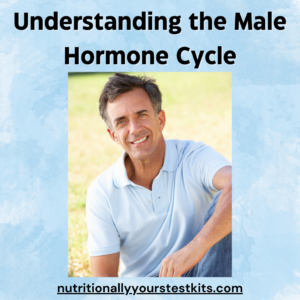The male hormone cycle, a topic often shrouded in mystery, is a crucial aspect of men’s health.
Understanding this cycle can shed light on various aspects of male physiology and the way they experience symptoms.
This article aims to demystify the male hormone cycle. We will delve into the primary male hormones, their roles, and their cyclical nature.
We will also address common questions such as “Do men have hormone cycles?” and “What are male hormones?”
Furthermore, we will explore the causes and implications of hormonal imbalances in men.
By the end of this article, you will understand the male hormone cycle and why it is important for men’s health.

The male hormone cycle is a complex process involving several hormones.
The most prominent among these is testosterone, which plays a pivotal role in male physiology.
Other hormones, such as cortisol and adrenaline, also play significant roles. These hormones fluctuate throughout the day, influenced by various factors including sleep, diet, and stress.
Understanding these fluctuations can provide insights into mood changes, energy levels, vitality, libido, and overall health.

Male hormones, also known as androgens, are a group of hormones that regulate male characteristics.
The primary male hormone is testosterone, which is responsible for muscle growth, bone density, and sexual function.
Besides testosterone, there are other important androgens like dihydrotestosterone (DHT) and androstenedione. DHT helps develop male characteristics and hair growth, while androstenedione is a precursor to testosterone and estrogen. Hormones like cortisol and adrenaline, made by the adrenal glands, affect health by controlling stress and energy levels. Understanding how these hormones work together to keep men healthy and address hormone imbalances is important.
Testosterone levels in men fluctuate throughout the day. This fluctuation follows a circadian rhythm, with levels peaking in the morning and gradually declining throughout the day. Testosterone levels rise in the morning, making men feel more energetic and alert. This happens shortly after waking up, when levels are at their highest point.
Understanding this daily cycle can help men optimize their routines to align with their natural hormone rhythms, whether it’s planning workouts, engaging in mentally demanding tasks, or addressing sexual health. By tuning into these natural fluctuations, men can enhance their overall well-being and performance.
While both men and women experience hormonal cycles, the patterns differ significantly.
Women’s hormone cycles are typically monthly, revolving around the menstrual cycle. Men, on the other hand, experience daily hormonal fluctuations, primarily in testosterone levels.
Andropause, also known as “male menopause,” is when male hormone levels change as men age.
Unlike menopause in women, andropause involves a slow, steady reduction in testosterone levels, rather than a sudden drop.
The decline in health can begin in the mid-30s and continue as we get older. This can cause symptoms like low sex drive, less muscle mass, tiredness, and changes in mood. Men can manage their health better by understanding andropause. You can achieve this by eating well, exercising, getting hormone levels tested, and possibly trying hormone replacement therapy.
Various factors can cause hormonal imbalances in men. These include chronic health conditions, environmental toxins, stress, poor diet, and lifestyle choices.
Symptoms of hormonal imbalances in men can include fatigue, mood swings, decreased sexual desire, weight gain, poor focus, depression, sleep disturbances, and reduced muscle mass.
It’s important to note that these symptoms can also be associated with other health conditions. Doing thorough metabolic tests is important to determine why you are not feeling your best.
We normally suggest:
Lifestyle factors play a significant role in hormonal health. Poor diet, lack of exercise, and high stress levels can all contribute to hormonal imbalances.
Conversely, a balanced diet, regular physical activity, and stress management techniques can support healthy hormone levels. These lifestyle modifications can be a crucial part of managing the male hormone cycle.
Maintaining hormonal health requires a proactive approach. At Nutritionally Yours, we use saliva testing to measure these markers. Saliva tests give a clearer picture of hormone levels than blood tests. This can help you understand your hormonal health better and catch any imbalances sooner.
Saliva testing is better than blood testing because it can measure all hormones in your body, making it more efficient. Blood testing, meanwhile, only looks at the hormones currently “bound” to the tissues in your body. It is better to look at hormone potential rather than only what is currently in use.
Solutions for hormonal imbalances can start with lifestyle changes. Lifestyle changes can involve diet modifications, exercise, stress management, and adequate sleep.
Then you can run comprehensive testing to get the answers and clear direction you need. Following testing comes natural, herbal supplementation or medical treatment. The approach depends on the severity of the imbalance and the individual’s overall health. The approach is a personal decision made by each person.
Understanding the male hormone cycle is a crucial aspect of overall health. Embracing a holistic approach, including regular monitoring, lifestyle modifications, and professional advice, can help maintain hormonal balance. Listen to your body’s natural rhythms and address imbalances early to improve your health and well-being.
Time to take charge of your hormonal health and enhance your overall vitality. Start by ordering a male hormone and cortisol test, along with comprehensive bloodwork. These tests will give you important information about your hormones and health, helping you make smart choices for your well-being.
Test results will provide personalized protocols to support your body and hormones as you work towards thriving. Don’t wait any longer – invest in your health today and embark on a journey towards optimal wellness.

I have been working in the field of holistic health and wellness for over 30 years. Nutritionally Yours has a functional medicine medical doctor on staff. Nutritionally Yours offers a wide variety of at-home blood test kits, nutrition test kits at, home health test kits, nutrition, naturopathic, metabolic and weight loss appointments Monday – Friday 9-4 EST.
Our goal and mission is to help our clients get to the root cause of health or weight loss struggles so you can feel healthier, confident, and accomplish more in life.
BOOK a virtual health and nutrition appointment today, so we can listen to your health concerns and guide you on the right path to feeling fantastic again.
Let’s get you feeling happier, healthier, confident, energized and feeling amazing.